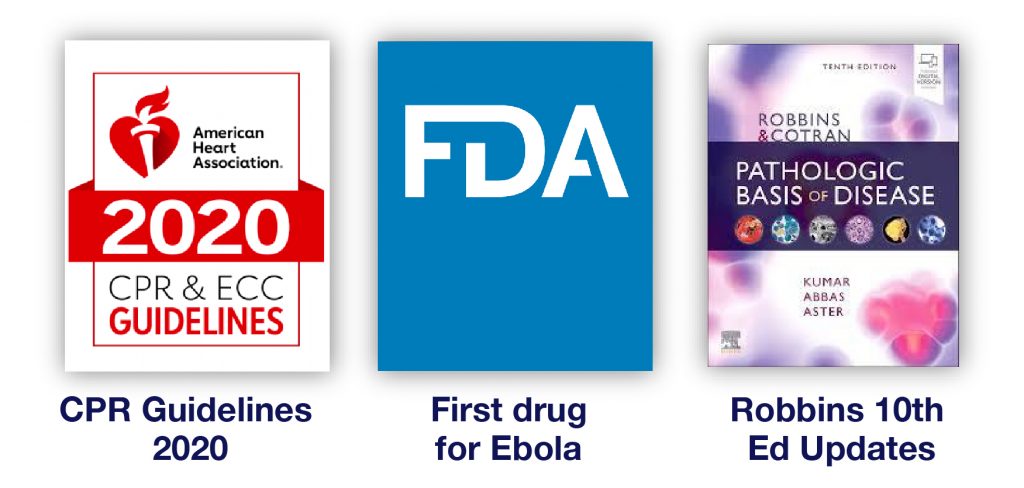QBank Fortnightly Newsletter Vol: 1, Issue: 9
Hello!
We are back with more interesting updates.
This time we talk about the recent American Heart Association (AHA) updates, the first drug approved for Ebola, and more updates from the latest edition of Robbins. Please take a look.
To find the relevant MCQs, copy the MCQ IDs given under each topic and search for them in the Marrow app.
1. FDA approves first treatment for Ebola virus
MCQ ID -MA8139
On 14th October 2020, the U.S. Food and Drug Administration (FDA) approved Inmazeb (Atoltivimab, Maftivimab, and Odesivimab-ebgn), a mixture of three monoclonal antibodies, as the first FDA-approved treatment for Zaire ebolavirus (Ebola virus) infection in adult and pediatric patients.
Reference-https://www.fda.gov/news-events/press-announcements/fda-approves-first-treatment-ebola-virus
2. American Heart Association (AHA) guidelines for CPR and ECC 2020
MCQ ID- MD5884| MD5883| MD5881. Pearl ID- 188
Adult Basic and Advanced life support:
- A sixth link, ‘recovery’ has been added to all 4 chains of survival
IHCA (In-hospital cardiac arrest) chain of survival includes:
- Early recognition and prevention
- Activation of emergency response
- High-quality CPR
- Defibrillator
- Post cardiac arrest care
- Recovery
- Double sequential defibrillation not supported
The usefulness of double sequential defibrillation for refractory shockable rhythm has not been established.
- Early administration of epinephrine
With respect to timing, for cardiac arrest with a non-shockable rhythm, it is reasonable to administer epinephrine as soon as feasible.
- Early Initiation of CPR by Lay Rescuers
AHA recommends that laypersons initiate CPR for presumed cardiac arrest because the risk of harm to the patient is low even if the patient is not in cardiac arrest.
- Real-Time Audiovisual Feedback
It may be reasonable to use audiovisual feedback devices during CPR for real-time optimization of CPR performance.
- Cardiac Arrest in Pregnancy
- As pregnant patients are more prone to hypoxia, oxygenation and airway management should be prioritized during resuscitation from cardiac arrest in pregnancy.
- Because of potential interference with maternal resuscitation, fetal monitoring should not be undertaken during cardiac arrest in pregnancy.
- The AHA recommends targeted temperature management for pregnant women who remain comatose after resuscitation from cardiac arrest.
- During targeted temperature management of the pregnant patient, it is recommended that the fetus be continuously monitored for bradycardia as a potential complication, and obstetric and neonatal consultation should be sought.
- IV Access Preferred Over IO
It is reasonable for providers first to attempt establishing IV access for drug administration in cardiac arrest. Intraosseous (IO)access may be considered if attempts at IV access are unsuccessful or not feasible.
- Post–Cardiac Arrest Care and Neuroprognostication
Neuroprognostication should be performed no sooner than 72 hours after return to normothermia, and prognostic decisions should be based on multiple modes of patient assessment. EEG, neurological imaging is introduced as part of post-resuscitation care.
Pediatric Basic and advanced life support
- Cuffed ETTs
It is reasonable to choose cuffed ETTs over uncuffed ETTs for intubating infants and children. When a cuffed ETT is used, attention should be paid to ETT size, position, and cuff inflation pressure (usually <20-25 cm H2O).
- Changes to the Assisted Ventilation Rate: Rescue Breathing
For infants and children with a pulse but an absent or inadequate respiratory effort, it is reasonable to give 1 breath every 2 to 3 seconds (20-30 breaths/min).
- Cricoid Pressure During Intubation
Routine use of cricoid pressure is not recommended during the endotracheal intubation of pediatric patients.
- Emphasis on Early Epinephrine Administration
For pediatric patients in any setting, it is reasonable to administer the initial dose of epinephrine within 5 minutes from the start of chest compressions.
- Corticosteroid Administration
For infants and children with septic shock unresponsive to fluids and requiring vasoactive support, it may be reasonable to consider stress-dose corticosteroids.
- A new algorithm for pediatric tachycardia with a pulse (QRS duration 0.09 sec)
A wide QRS duration of >0.09 second is suggestive of possible ventricular tachycardia.
3. X-linked osteopetrosis
MCQ ID- MD5880
Osteopetrosis can have an X-linked pattern of inheritance. It occurs due to IKBKG mutation which encodes NEMO. It is involved in NF-kB activation. Because NF-kB serves many other functions, IKBKG mutations result in a multisystem disorder called X-linked anhidrotic ectodermal dysplasia with immunodeficiency, which includes osteopetrosis.
Reference- Robbins and Cotran 10th edition, page no 1177
4. Occluding junctions (tight junction)
MCQ ID- MB9305
According to Robbins and Cotran 10th edition, complexes that mediate the tight junctions are composed of transmembrane proteins including the claudin and tight junction-associated MARVEL protein (TAMP) families. These connect to a host of intracellular adaptor and scaffolding proteins, including the three members of the zonula occludens protein family (ZO-1, ZO-2, ZO-3) and cingulin.
Reference- Robbins and Cotran 10th edition, Page no 12
Get the latest updated QBank MCQs from the Marrow Facebook page. ‘Like’ us by clicking here– One MCQ every day.
To see the previous issues of the newsletter, click here



Good
The best platform to learn. Well done Marrow. Keep on enlight medicos🙏
Thanku marrow
TanQ marrow ♥️
Thank you
Thank You very much for current information.
Superb job marrow…..very informative newsletter
Thank you again…MARROW 💚
Thank you marrow
Thank Team marrow.
Thank you for the information
Super 👍
Thank you marrow once again👍
Thank u 😊
Thank you so much❤️
Thanks
Thank you team marrow for such updates.
Marrow ❤️❤️💪😱
Thanks Marrow
Marrow u guys are really doing a good job👌👌👌 very informative..loved this newsletter
Thanq
Thank you so much once again 🙏🏻
Thank you marrow
Thnq marrow
Thank you marrow😊💛
Thank you so much marrow
🙏
Thanks a ton, MARROW
Thanku marrow
Very useful dear marrow team
Helpfull. Thanks.
Thank you!! Marrow
Thank for updates !!
Very useful marrow
East or west marrow is best
Thank u
🙏
Thank you marrow
Thank u marrow!❤